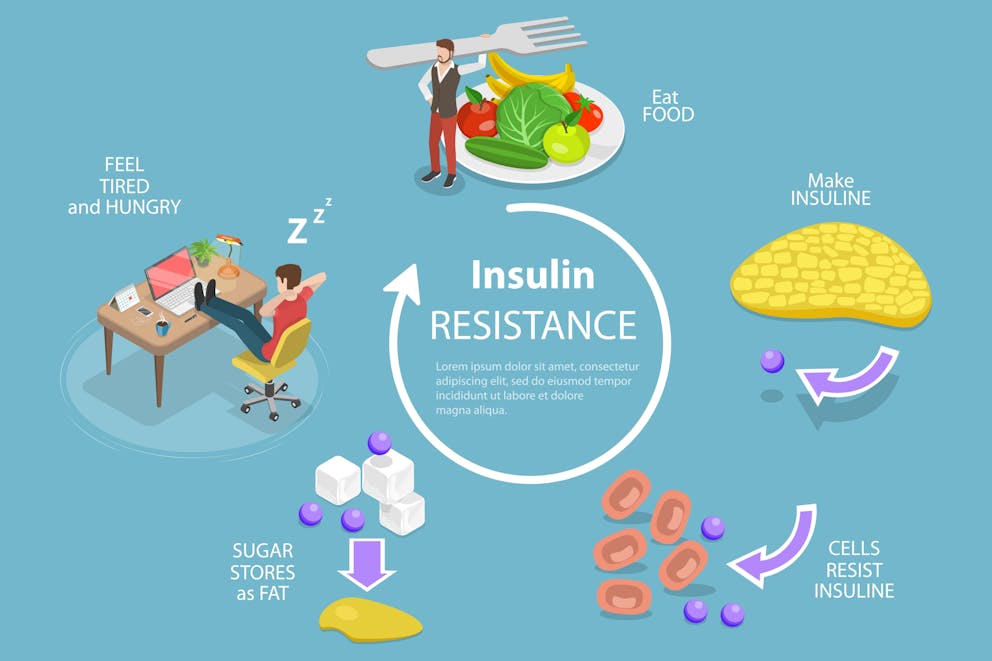Worst Advice for a Diabetic
Imagine stepping into a world where your morning toast or that comforting bowl of pasta could be the villain in your health narrative.
Yes, we're talking about carbohydrates. They're everywhere, from the white bread hugging your sandwich to the sugar sprinkled on your favorite cereal. But here's the twist: not all carbs are created equal.
The debate rages on with blood sugar levels at its core. The American Diabetes Association throws a curveball by recommending diets high in carbohydrates for those managing diabetes—yet this advice is as controversial as it gets.
It's like advising someone trying to avoid sunburn to spend more time outdoors without sunscreen.
A deep dive reveals startling connections between carb intake and our body’s reaction—insulin spikes, energy crashes, and endless hunger pangs.
Yet, amidst this chaos, there lies hope—a possibility that understanding glycemic load and making smarter food choices can lead us out of this labyrinth.
The Controversy Surrounding High-Carbohydrate Diets for Diabetics
The American Diabetes Association's recommendation for a high carbohydrate intake in diabetic diets has sparked a heated debate among healthcare professionals and patients alike.
While some argue that a carbohydrate-rich diet can help manage blood sugar levels, others point out the potential risks of this approach.
The controversy stems from the fact that carbohydrates directly impact blood glucose levels, and consuming too many carbs can lead to spikes in blood sugar.
This is particularly concerning for individuals with diabetes, who already struggle to regulate their blood glucose levels effectively.
Understanding Carbohydrate Impact on Blood Sugar Levels
Carbohydrates are the primary macronutrient that affects blood sugar levels. When we consume carbs, our body breaks them down into glucose, which enters the bloodstream and triggers insulin release from the pancreas.
Insulin helps cells absorb glucose from the blood, thus lowering blood sugar levels.
However, in individuals with diabetes, this process is impaired. Either the body doesn't produce enough insulin (Type 1 diabetes), or the cells become resistant to insulin's effects (Type 2 diabetes).
As a result, blood glucose levels remain elevated, leading to various health complications over time.
The Cycle of Medication and Carbohydrate Consumption
Many individuals with diabetes rely on medications such as insulin injections or oral hypoglycemic agents to manage blood sugar levels. These medications increase insulin production or improve the body's sensitivity to insulin.
However, a high-carbohydrate diet can create a vicious cycle. Consuming large amounts of carbohydrates leads to spikes in blood sugar, which requires more medication to bring levels back down.
This, in turn, can cause episodes of hypoglycemia (low blood sugar), prompting individuals to consume more carbohydrates to counteract the effects.
The American Diabetes Association recommends that 60% of a diabetic's diet should consist of carbohydrates, while the American Obesity Society also advocates for a high carbohydrate intake.
These recommendations have come under scrutiny, as some experts argue that they may contribute to the cycle of medication and carbohydrate consumption, ultimately making it harder for individuals to achieve stable blood glucose levels.

The Link Between Dietary Recommendations and Insulin Resistance
In addition to the controversy surrounding high carbohydrate diets, specific dietary recommendations for individuals with diabetes have also been called into question.
Two such recommendations are limiting salt intake and using diuretics to manage blood pressure.
Salt Intake and Its Effects on Insulin Sensitivity
Traditionally, individuals with diabetes have been advised to reduce their salt intake to help manage blood pressure and reduce the risk of cardiovascular complications. However, recent research suggests that low salt intake may negatively impact insulin sensitivity.
A study published in the Journal of Clinical Investigation found that a low-salt diet can trigger insulin resistance in healthy individuals.
The researchers hypothesized that this effect may be even more pronounced in those with diabetes, who are already predisposed to insulin resistance.
The Role of Diuretics in Insulin Resistance
Diuretics are commonly prescribed to individuals with diabetes to help manage blood pressure. These medications work by increasing urine production, which helps to remove excess fluid from the body and lower blood pressure.
However, diuretics can also have an unintended consequence: they may worsen insulin resistance.
A study published in Diabetes Care found that the use of thiazide diuretics was associated with an increased risk of developing diabetes, likely due to their negative impact on insulin sensitivity.
These findings suggest that the current dietary recommendations for individuals with diabetes may need reevaluation.
While managing blood pressure is crucial, it's essential to consider the potential impact of these recommendations on insulin resistance and overall glucose control.
Reevaluating Fat, Cholesterol, and Whole Grains in Diabetic Diets
Traditional advice has often focused on low-fat diets, cholesterol management with statins, and the inclusion of whole grains, but these recommendations may need to be reconsidered.
The Misconception of Low-Fat Diets
For years, low-fat diets have been promoted as a way to manage diabetes and reduce the risk of cardiovascular complications. However, the effectiveness of this approach has come under scrutiny in recent years.
While reducing saturated and trans fats is essential for overall health, a diet that is too low in fat may be detrimental for individuals with diabetes. Fat helps to slow down the absorption of carbohydrates, which can help to prevent spikes in blood sugar.
Additionally, some healthy fats, such as those found in avocados, nuts, and olive oil, have been shown to improve insulin sensitivity.
Statins and Their Impact on Blood Sugar Control
Statins are commonly prescribed to individuals with diabetes to help manage cholesterol levels and reduce the risk of cardiovascular disease.
While these medications effectively lower LDL (bad) cholesterol, they may also unintentionally impact blood sugar control.
Some studies have suggested that statins can increase the risk of developing diabetes, particularly in individuals who are already at high risk.
A meta-analysis published in The Lancet found that statin therapy was associated with a 9% increased risk of developing diabetes.
Whole Grains vs. Refined Sugars
Whole grains are often touted as a healthier alternative to refined carbohydrates for individuals with diabetes. However, their glycemic impact may not be as favorable as once thought.
While whole grains do contain more fiber and nutrients than refined grains, some whole grain products can still have a relatively high glycemic index.
Some studies have found that certain whole grains, such as whole wheat bread, can have a similar glycemic impact to refined sugars.
This doesn't mean that whole grains should be avoided altogether, but it does highlight the importance of considering the glycemic load of foods rather than just their classification as "whole grain" or "refined."
Strategies for Managing Blood Sugar Through Diet
Given the controversies and questions surrounding traditional dietary recommendations for individuals with diabetes, it's essential to consider alternative strategies for managing blood sugar through diet.
These strategies empower individuals to make informed choices about their carbohydrate intake and overall dietary patterns.
Carb Counting and Meal Planning
Carb counting is a method of managing carbohydrate intake by tracking the number of grams of carbs consumed at each meal and snack.
This approach allows individuals to make more informed choices about their food intake and can help prevent spikes in blood sugar.
Meal planning is another essential strategy for managing blood sugar through diet.
By planning meals and focusing on nutrient-dense, low-glycemic foods, individuals can better control their carbohydrate intake and ensure they get the nutrients they need to support overall health.
Incorporating Physical Activity into Diabetes Management
Physical activity is an essential component of diabetes management that is often overlooked. Regular exercise can help to improve insulin sensitivity, lower blood sugar levels, and reduce the risk of cardiovascular complications.
Incorporating physical activity into daily routines, such as taking a brisk walk after meals or engaging in regular strength training, can significantly impact blood sugar control and overall health.
Understanding Glycemic Index and Load
The glycemic index (GI) measures how quickly a food raises blood sugar levels, while the glycemic load (GL) considers both the GI and the amount of carbohydrates in a serving.
By focusing on low-GI and low-GL foods, individuals with diabetes can help minimize spikes in blood sugar and improve overall glucose control. Some low-GI foods include non-starchy vegetables, legumes, and certain fruits, such as berries.
It's important to note that consuming carbohydrates, even from healthy sources, can still lead to increased insulin levels and potentially contribute to the development of diabetes over time.
Additionally, medications used to lower blood sugar levels can cause hypoglycemia as a side effect, which is often managed by consuming frequent small meals and glucose tablets.
Mastering Blood Sugar with Diet and the Matcha Keto Mystery
In the carb control saga, delving into matcha's mysteries on the keto journey can unlock potent solutions. As you navigate the intricate balance of blood sugar levels, incorporating matcha into your diet may hold the key to success.
Pairing matcha with keto green beans could create a symphony of flavors while supporting your quest for metabolic harmony.

Mastering Blood Sugar with Diet and the Matcha Keto Mystery
We delve into the intricate dance between diet and blood sugar management. One intriguing element of this journey is the Matcha Keto Mystery—is matcha keto?
Matcha, known for its vibrant green hue and potent antioxidants, has gained popularity in keto circles due to its low carbohydrate content and potential metabolism-boosting properties.
However, some debate surrounds its exact role in ketosis and blood sugar regulation. Exploring the matcha keto connection adds an exciting twist to the quest for balanced blood sugar levels through dietary choices.
Conclusion
So, we've taken a stroll down the complex carb lane. What a journey it's been. Far from being the dietary villains Hollywood has cast them as, carbs are more like misunderstood heroes of our daily nutrition - crucial but requiring careful management.
The story isn't about avoiding carbs altogether; it’s about choosing your carb allies wisely. Understanding glycemic load wasn’t just an academic exercise—it was akin to learning a secret language that lets us whisper sweet nothings to our blood sugar levels.
We talked about insulin spikes like they were plot twists in an epic saga—because, let's face it, managing diabetes often feels like navigating through an intense thriller.
The advice from well-meaning health bodies? It's more confusing than helpful at times. But armed with knowledge and insight into how our bodies react to different foods, we’re better equipped.
From debunking myths surrounding diabetic diets to highlighting the silent role physical activity plays in this narrative—the takeaway is clear: control over one’s health narrative is possible and within reach.
It requires understanding, patience, and, most importantly—a shift towards smarter choices that support managing and thriving with diabetes.
This isn't just another chapter in your healthcare book; this could very well be the beginning of a healthier you.
So yes, carbohydrates have their place on our plates—they're part of the ensemble cast in our nutritional screenplay—not always front and center but essential all the same.
Supporting Data
Previous blog
What Is Autonomic NeuropathyNext blog
When Are Ketones Dangerous
Popular
08/21/2024
55.8K views
02/23/2025
46.9K views
11/18/2024
281.5K views
03/18/2024
11/21/2022




